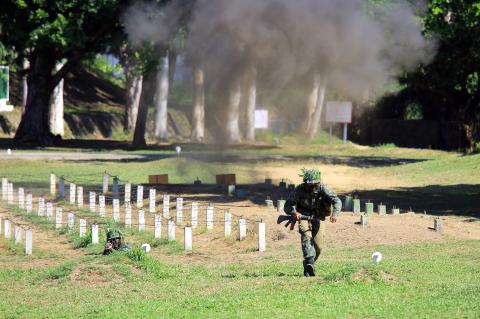“Look lively! Attack!” As the squad leader gives the order, the trainees, each packing 10 kgs of equipment, can now put everything they have learned in training to use: working in unison, their bodies prostrate on the ground, they crawl forward on all fours, ignoring the mud, clambering over barbed-wire fencing and taking on the eight hurdles in front of them.
Dodging the explosions and machine-gun fire bursting around them, the trainees charge forward into enemy lines, the incessant barrage of bombs exploding around them and the air thick with smoke, fearlessly navigating the bomb craters and the ramped earth obstacles, over more barbed wire entanglements, and then breaking through the enemy defences, moving ever forward.
All the time, they are attacked with live grenades lobbed their way and smoke grenades being set off around them in a simulation of an actual battle scenario. They are now asked to overcome their fear and remove their face masks: as part of the final chemical, biological, radiological and nuclear attack (CBRN) drill, they are required to rebuff an indoors tear gas attack. Working together, they must fight through the toxic fumes, eyes and noses streaming, and finally sprint forward yelling “KILL,” charging at the enemy with their bayonets, stabbing, striking, hacking, in a test of their mettle.

Photo: Chen Wen-chan, Liberty Times
According to Major Liu Nai-yu, the military instructor for the classes, these training days are both a high-stress test and a major part of the selection process for entering the military.
(Liberty Times, translated by Paul Cooper)
「注意!攻擊前進!」,隨著班長下達命令,新生身上揹負十公斤重裝備,大家發揮平時訓練,展開團隊合作,一起壓低身子,趴在地上前進,不顧滿身泥濘,攀爬屋頂型鐵絲網,挑戰八道關卡。

Photo: Chen Wen-chan, Liberty Times
新生們在炸藥與機槍的砲火中衝鋒陷陣,儘管砲聲不斷、煙霧瀰漫,仍然毫不畏懼,通過彈坑、土堤障礙,再攀爬高絆網,摧毀敵側防機關,一路奮勇向前。
現場更搏命投擲實彈,施放煙霧彈,模擬戰爭實境, 場景逼真。新生必須克服心理恐懼,脫掉防毒面具,接受化生放核訓練考驗,在房間內接受催淚瓦斯攻擊。新生們一起對抗毒煙,淚眼、鼻涕直流,最後衝刺喊「殺」,以刺刀對敵衝鋒,突刺、上擊、砍劈,考驗堅強的意志力。
授課教官劉乃瑜少校表示,震撼教育是一項高負荷的測驗,也是入伍訓練中的重頭戲。
(自由時報記者陳文嬋)

A: The news says comic superstar Snoopy’s birthday is coming soon on Aug. 10. B: So he’s a Leo, and his birthday will fall on this Sunday. A: Cartoonist Charles Schulz created the comic strip Peanuts, featuring Snoopy, in 1950. And this year marks the character’s 75th anniversary. B: No wonder there are some big celebrations in Japan, Hong Kong and elsewhere. How about Taiwan? A: The “How Do You Do, Snoopy?” exhibition is taking place in Taipei. Let’s go to Shin Kong Mitsukoshi Department Store’s A11 branch to see the show. A: 新聞說,卡通巨星史努比的生日是8月10日耶。 B: 原來史努比是獅子座,本週日就是他的生日。 A: 漫畫家查爾斯舒茲1950年在《花生》漫畫創造了該角色,今年正好歡慶75週年! B:

A: Apart from the “How Do You Do, Snoopy?” exhibition, the Penghu International Fireworks Festival displayed some Snoopy-themed balloon installation art. B: The Yilan International Children’s Folklore & Folkgame Festival also displayed a giant rubber “Snoopy Duck.” A: And Starbucks, Kura Sushi and 7-Eleven are all selling Snoopy-themed products. B: Starlux Airlines even launched new Snoopy-themed flights recently. Isn’t that cool? A: Taiwanese love Snoopy so much. Happy 75th birthday, Snoopy. A: 除了《How Do You Do, Snoopy?花生漫畫75週年特展》,澎湖海上花火節展出了史努比氣球裝置藝術。 B: 而宜蘭國際童玩藝術節,則展出了巨型「史努比鴨」。 A: 星巴克、藏壽司、7-Eleven也推出了史努比聯名商品。 B: 星宇航空今年更推出全新「Snoopy主題航班」,很酷吧? A: 台灣人好愛史努比啊,75歲生日快樂!

Whale sharks are the largest species of fish in the world. They aren’t related to whales, but take their name due to their enormous size. At full maturity, whale sharks measure around nine or 10 meters long and can weigh from 15,000 to 40,000 kilograms. Whale sharks live in warm waters, with about 75% of them found in the Indo-Pacific region. They can migrate thousands of kilometers to different feeding grounds, but at a slow speed of 5 km/h on average. Whale sharks have a broad, flat head and are typically brown or gray in color. Their distinguishing characteristic

Continued from yesterday(延續自昨日) https://www.taipeitimes.com/News/lang Whale shark reproduction has long been a mystery for scientists. However, a significant discovery in 1995 off the eastern coast of Taiwan provided valuable insights. Researchers examined a pregnant female of the species and found over 300 embryos inside her body, ranging from about 40 to 60 cm in length. This discovery revealed that whale sharks are ovoviviparous. Instead of laying eggs in the ocean, the mother carries them internally until they hatch, giving birth to fully developed live young. Since the eggs don’t hatch all at once, embryos at different stages of development can all exist within